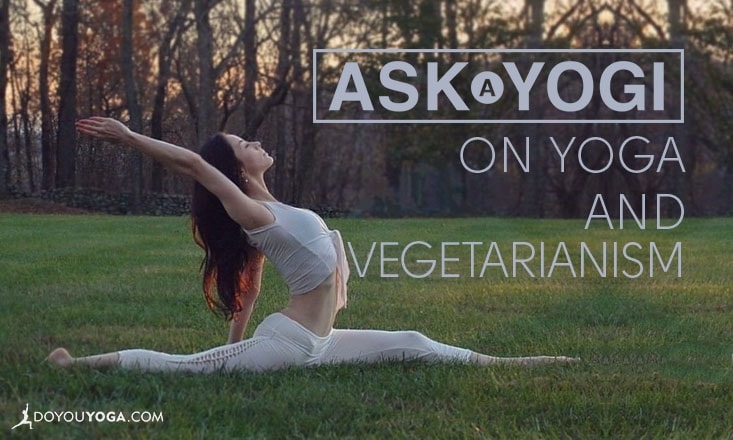We often hear about yoga and a vegetarian lifestyle in conjunction with each other that a lot of people think you have to be a vegetarian to practice yoga. But what exactly is the link between yoga and vegetarianism?
Is it really true that you have to be a vegetarian to practice yoga? Can I still be yogic if I eat meat occasionally? These are some of the most common questions that I am asked as a yoga teacher. So if you're curious about this too, hopefully this will help you find answers.
The Link: Ahimsa
Modern-day yoga is taught in many different ways. There are about a million different schools, styles and types of yoga that are on offer at just about any given yoga studio. But, customarily, yoga’s main system is taught in the Ashtanga tradition (not to be confused with Sri K. Pattabhi Jois’s set-series Ashtanga Vinyasa yoga).
The Ashtanga tradition is an eight-limbed path to enlightenment outlined in Patanjali’s Yoga Sutras. The first limb along this path is the yamas (or the restraints that yogis are meant to adhere to), the first of which is ahimsa.
Ahimsa translates to nonviolence or non-harming and can be (and is!) interpreted in many different ways. One of the most common interpretations of this concept in the yoga world is the adoption of vegetarianism (equating to not harming animals). While this interpretation is a very valid one, it is still an interpretation.
Yoga is a lifestyle choice, and while many yogis choose to be vegetarians in compliance with ahimsa, again—this is a choice. Every person is different and every person can interpret ideology in his or her own ways.
So, this is the basic link between yoga and vegetarianism: the practice of ahimsa.
Are All Yogis Vegetarian?
This is a very tricky question and it certainly depends on whom you ask. There are many strict yogis that say you cannot be yogic without being a vegetarian. And then there is the opposite side of the spectrum that says what you eat has absolutely nothing to do with your yoga practice.
Technically speaking, there are plenty of people who identify as yogis and who also identify as meat eaters.
Do You Have To Be Vegetarian To Practice Yoga?
Despite what was mentioned, is it still possible to be yogic while eating meat? I’m sure I’ll receive a lot of backlash for this, but I think it absolutely is.
As noted, the interpretation of ahimsa as being synonymous to vegetarianism is just that—an interpretation. So that does not make it fact or sacred truth. Even beyond this, yoga is a personal journey, so it cannot be outlined or defined in a “one size fits all” text.
Just as one cue for the physical practice cannot be applied to every single student, one cue in the spiritual practice cannot be applied to every practitioner either.
There are many ways to adhere to nonviolence and non-harming other than just adopting vegetarianism. Everyone has different bodies that require different things, so for some, eating meat may actually equate to nonviolence and non-harming toward themselves. For others, the opposite may be true.
Does Being Vegetarian Make One More Yogic Than Others?
Personally, I know countless people who practice yoga (and eat meat) and still receive ceaseless benefits from the practice. I believe that yoga is not defined by what you eat; it is defined by your relationship to your thoughts. Being a vegetarian does not make one yogic and eating meat does not make one non-yogic. I believe that only a yogi can determine his or her own path internally.
I, myself, choose to be a vegetarian for many reasons, one of which is ahimsa. However, I also try to expand this concept of nonviolence beyond just physical violence and into the more esoteric scope of mental violence. I try my best not to judge others for the choices they make or to try to impose my beliefs upon them.
While I personally choose to be a vegetarian, I can respect those who choose otherwise. I believe that yoga is much greater than any food choices. I believe we should be turning our attention inward and listening to our own divinity to find our own answers about such subjects—whether those answers lie in eating meat, chanting mantras, practicing kindness or simply breathing.
Image credit: Odette Hughes


